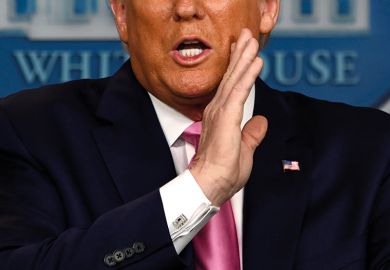It didn’t take long for Chinese studying overseas to be blamed for the spread of the new coronavirus. Many have reported incidents of name-calling, hostility and even violent attacks in the US and the UK, while students have been marginalised and even excluded from classrooms.
These incidents have caused distress and alarm to many of the 700,000 or so Chinese nationals studying abroad, but they are not altogether unexpected: Chinese students have often been dragged into global political crises that have little to do with them.
Back in November, their presence on UK campuses was speculatively linked by MPs to alleged Chinese interference in academic research, although only the flimsiest of evidence was made public. In Australia, they were accused of silencing Hong Kong nationals who were showing their support on campus for student occupations during the protests in that special administrative region. Meanwhile, Huawei’s recent £5 million investment in Imperial College London to support basic research led to further howls of protest; and US politicians have pushed the narrative that American universities are a soft target for Chinese spies posing as students or staff.
Conspiracy theories about Chinese students “infiltrating” campuses to police the conversations of other expats are particularly popular. This worldview rests largely on the idea that all forms of pro-Chinese thought and speech could only be motivated by monetary incentives and bribery – as opposed to independent thinking from those who feel warmly towards their homeland. Attempts to call out the asymmetrical attacks on the Chinese people are also branded propaganda, and student bodies’ interactions with Chinese student associations have seemingly jettisoned all semblance of tolerance and rationality. Criticisms of the Chinese government for its autocratic and untransparent informational structures are fair and justified, but unnuanced smearing of young Chinese only spurs further isolation and withdrawal on the part of these students from the wider community – and potentially to anti-Western radicalisation.
That said, Chinese student activists sympathetic to the democracy movement have also come under fire from state agencies. Extreme portrayals and dismissals of Hong Kong activists as “foreign shrills” have left these students both antagonised and anxious over their personal well-being.
So what can overseas universities do to ensure that free speech about China flourishes? They must do more than merely call out behaviour that seeks to repress political dissent or criticism of China. Any harassment of liberal, progressive activists for their views threatens to endanger the very values of academic freedom that Western universities are founded on. It is imperative that those who seek to critique the excesses and flaws of the Chinese Communist Party be given a platform to do with sensibility and moderation.
But Western universities must also do more to understand their Chinese students. Administrators would benefit from actively reaching out to Chinese student associations and societies, giving them space to voice their concerns and thoughts.
That has begun to happen: the sudden closure of universities during the Covid-19 crisis has meant that administrators have needed to work closely with their students, families and peers. The reality of how visa restrictions and bureaucratic formalities affect those stranded during the crisis have highlighted some of the wider problems that confront Chinese international students, irrespective of their personal views.
Embassies and diplomats from both sides of what threatens to become a new Cold War have sadly transformed Chinese students into battering rams in their quest for ideological victory. But the campus should be a space safe for all to learn and debate without judgement and interference; this principle should be upheld for students of all political orientations and ethnicities.
We need open dialogue and sustained efforts to include Chinese students studying far from home – not denial and rejectionism.
Brian Wong is a DPhil candidate in politics at Balliol College, Oxford, a Rhodes Scholar (Hong Kong '20), and the founding editor-in-chief of the Oxford Political Review.
Register to continue
Why register?
- Registration is free and only takes a moment
- Once registered, you can read 3 articles a month
- Sign up for our newsletter
Subscribe
Or subscribe for unlimited access to:
- Unlimited access to news, views, insights & reviews
- Digital editions
- Digital access to THE’s university and college rankings analysis
Already registered or a current subscriber?








